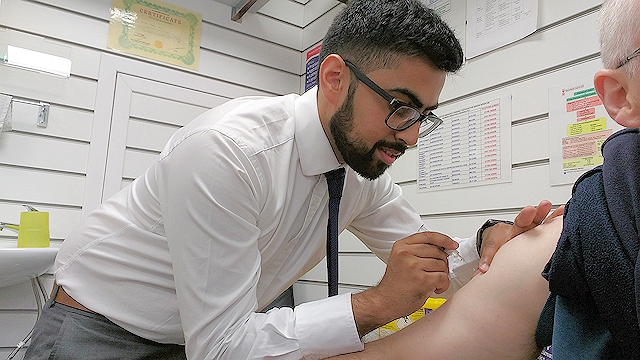Newly available flu vaccine could prevent deaths this winter
Date published: 12 September 2018

Flu vaccination
A new, more effective flu vaccine for those aged 65 and over this winter has the potential to prevent deaths and significantly reduce the burden on the NHS.
The new vaccine comes as records show there were at least 425 admissions to hospital intensive care units across the North West due to influenza last flu season (2017/18), compared to 104 admissions the previous season (2016/17). Throughout the 2018/19 season, intensive care unit admissions were seen particularly amongst older adults.
Nationally, the vaccine, available for the first time this year in the UK for those aged 65 and over, could reduce GP consultations due to flu by 30,000, hospitalisations by over 2000 and prevent over 700 deaths in England, alleviating some of the health burden that seasonal flu places on the population, workplaces and the NHS.
Across the North West, hundreds of thousands of people aged over 65 are set to benefit from the improved vaccine, with 74.6% (972,761) of people in this age group taking up the offer of flu vaccine in the region last flu season.
The newly available ‘adjuvanted’ vaccine is expected to significantly boost effectiveness by improving the body’s immune response to the vaccine. This is important because typically older adults’ bodies do not respond as well to the flu vaccine due to their naturally weaker immune systems. Older adults are also more likely to suffer complications from flu.
The broader flu vaccination programme will also be improved by offering eligible adults under 65, including pregnant women and those with long term health conditions a ‘quadrivalent’ vaccine in injected form, which protects against two strains of flu A and two strains of flu B. Last year, adults either received the trivalent or quadrivalent vaccine.
The quadrivalent vaccine contains two strains of Flu A and two strains of Flu B, as recommended by WHO. The main strains that circulated last winter were Flu A(H3N2), which largely affects older people, and Flu B.
PHE is in particular encouraging pregnant women; no matter how many weeks along they are, to get their vaccine from their GP, pharmacist or midwife this winter to protect them and their baby. Last year vaccine uptake was 47% in women who were expecting.
Dr Will Welfare, Consultant in Health Protection at PHE North West, said: “Our figures show that flu is not to be underestimated – every winter the virus makes hundreds of people seriously ill in the North West. While we can never fully predict how the virus will affect the population each year, the best protection we have against it is the flu vaccine.
“This is why we’re scaling up the programme this year by giving additional protection to all eligible adults and offering it to more children.
“I encourage anyone who is eligible to take up the offer of their free vaccine; it is there to protect you and the rest of your family from a potentially very serious illness.”
The vaccination programme will also be improved by extending the nasal spray vaccine offering to primary school children in year 5 (650,000 extra children), meaning the vaccine will be offered to children in years reception, 1, 2,3, 4 and 5. The programme will eventually roll out to all primary school children.
Children tend to be ‘super spreaders’ of flu, so protecting them is crucial for protecting the rest of the population.
Professor Jane Cummings, Chief Nurse for England, said: “Faced with the worst flu season in a decade, NHS staff last winter did a remarkable job providing care for patients.
“This year, the public will be better protected from flu than ever before, with at-risk groups being offered the most effective vaccine available and every member of NHS staff expected to get their jab.” “Last winter we saw a particularly harmful flu season and it placed a very serious burden on NHS resources. We know this year that staff will continue to do a fantastic job to ‘Help us Help You’ and minimise the spread of flu and help those who are most vulnerable to the virus.”
Do you have a story for us?
Let us know by emailing news@rochdaleonline.co.uk
All contact will be treated in confidence.
Most Viewed News Stories
- 1Middleton school hails another outstanding inspection result
- 2Former councillor and hospital campaigner Jean Ashworth has died
- 3No trams between Oldham and Rochdale this Sunday
- 4Drugs and cash seized during morning raids at suspected stash houses
- 5Northern Healthcare opens supported living service in former Rochdale hotel
To contact the Rochdale Online news desk, email news@rochdaleonline.co.uk or visit our news submission page.
To get the latest news on your desktop or mobile, follow Rochdale Online on Twitter and Facebook.


